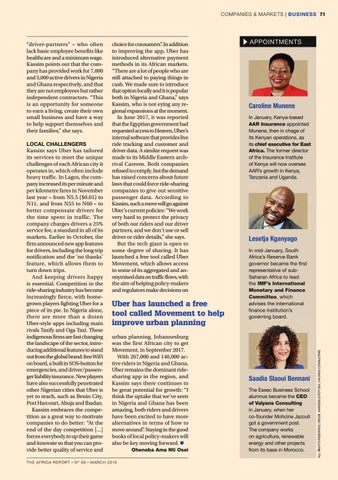COMPANIES & MARKETS | BUSINESS 71
LOCAL CHALLENGERS
Kassim says Uber has tailored its services to meet the unique challenges of each African city it operates in, which often include heavy traffic. In Lagos, the company increased its per minute and per kilometre fares in November last year – from N5.5 ($0.01) to N11, and from N55 to N60 – to better compensate drivers for the time spent in traffic. The company charges drivers a 25% service fee, a standard in all of its markets. Earlier in October, the firm announced new app features for drivers, including the long trip notification and the ‘no thanks’ feature, which allows them to turn down trips. And keeping drivers happy is essential. Competition in the ride-sharing industry has become increasingly fierce, with homegrown players fighting Uber for a piece of its pie. In Nigeria alone, there are more than a dozen Uber-style apps including main rivals Taxify and Oga Taxi. These indigenous firms are fast changing the landscape of the sector, introducing additional features to stand outfromtheglobalbrand:freeWiFi on board, a built in SOS-button for emergencies, and driver/passenger liability insurance. New players have also successfully penetrated other Nigerian cities that Uber is yet to reach, such as Benin City, Port Harcourt, Abuja and Ibadan. Kassim embraces the competition as a great way to motivate companies to do better: “At the end of the day competition […] forces everybody to up their game and innovate so that you can provide better quality of service and THE AFRICA REPORT
•
N° 98
•
choice for consumers”. In addition to improving the app, Uber has introduced alternative payment methods in its African markets. “There are a lot of people who are still attached to paying things in cash. We made sure to introduce that option locally and it is popular both in Nigeria and Ghana,” says Kassim, who is not eying any regional expansions at the moment. In June 2017, it was reported that the Egyptian government had requestedaccesstoHeaven,Uber’s internal software that provides live ride tracking and customer and driver data. A similar request was made to its Middle Eastern archrival Careem. Both companies refusedto comply,but the demand has raised concerns about future laws that could force ride-sharing companies to give out sensitive passenger data. According to Kassim,suchamovewillgoagainst Uber’s current policies: “We work very hard to protect the privacy of both our riders and our driver partners, and we don’t use or sell driver or rider details,” she says. But the tech giant is open to some degree of sharing. It has launched a free tool called Uber Movement, which allows access to some of its aggregated and anonymiseddataontrafficflows,with the aim of helping policy-makers and regulators make decisions on
Uber has launched a free tool called Movement to help improve urban planning urban planning. Johannesburg was the first African city to get Movement, in September 2017. With 267,000 and 140,000 active riders in Nigeria and Ghana, Uber remains the dominant ridesharing app in the region, and Kassim says there continues to be great potential for growth: “I think the uptake that we’ve seen in Nigeria and Ghana has been amazing, both riders and drivers have been excited to have more alternatives in terms of how to move around”. Staying in the good books of local policy-makers will also be key moving forward.
M A R C H 2 018
Oheneba Ama Nti Osei
Caroline Munene In January, Kenya-based AAR Insurance appointed Munene, then in chage of its Kenyan operations, as its chief executive for East Africa. The former director of the Insurance Institute of Kenya will now oversee AAR’s growth in Kenya, Tanzania and Uganda.
Lesetja Kganyago In mid-January, South Africa’s Reserve Bank governor became the first representative of subSaharan Africa to lead the IMF’s International Monetary and Finance Committee, which advises the international finance institution’s go e g boa d governing board.
Saadia Slaoui Bennani The Essec Business School alumnus became the CEO of Valyans Consulting in January, when her co-founder Mohcine Jazouli got a government post. The company works on agriculture, renewable energy and other projects from its base in Morocco.
ALL RIGHTS RESERVED; DENZIL MAREGELE/FOTO24; VALYANS CONSULTING
“driver-partners” – who often lack basic employee benefits like healthcare and a minimum wage. Kassim points out that the company has provided work for 7,000 and 3,000 active drivers in Nigeria and Ghana respectively, and that they are not employees but rather independent contractors. “This is an opportunity for someone to earn a living, create their own small business and have a way to help support themselves and their families,” she says.
